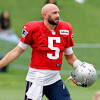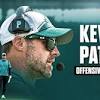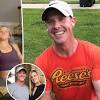Live Forever: Oasis's 'Definitely Maybe', 30 Years On


It’s late January, 1994. Alerted by a friend, I go to see a new Manchester group, Oasis, at The Water Rats near King’s Cross in London. There’s a buzz: the smallish venue is packed, which makes it difficult to see what is happening on the low stage. A couple of numbers in, I get it: they’re good. The four musicians, dressed in scally/baggy/sportswear, erect an overdriven wall of sound, while the vocalist — wearing what looks like a Marks & Spencer’s pullover —commands the crowd with a definite attitude.
The frontman’s swaggering demeanour suggests confrontation but, at the same time, he embodies a curious precision: I’m going to stand just here, place the microphone just so, and sing the lyrics exactly this way. He elongates various vowels and phrases in an almost exact reproduction of John Lennon’s psychedelic sneer on “Rain”, a deal sealed by the group’s rather convincing cover of “I Am the Walrus” at the end of the set. They make it their own, and I’m impressed.
This isn’t Oasis’s first London show, but it’s a kind of showcase: full of journalists and fans, the curious and the competitive. The band carry it off with what many people will, soon enough, recognise as their customary blithe insouciance. On the way out, I’m accosted by an EMI press officer: why didn’t I go see Blur rather than this lot, she demands; I reply that if I wanted to go to see Blur then I would, and I don’t. Seems like unprofessional behaviour, but the needle is already there.
Nineteen-ninety-four was a good year for music. The dominant sound that I heard emanating from cars, shops, pubs and clubs in London was dance music and its myriad derivatives: the seemingly infinite and proliferating varieties of house, techno, rap, hardcore. I absolutely loved the multiple times of jungle — hyper-speed breakbeats jamming up against half-speed reggae bass — and heard it at its best at that summer's Notting Hill Carnival, where the record of the year — Shy FX’s Sound of the Beast — sampled the Carnival song of 1976, Junior Murvin’s “Police and Thieves”.
At the beginning of 1994, the UK charts were the usual mix of contemporary dance music (Chaka Demus & Pliers’ great Latin/ragga cover of “Twist and Shout”), novelties (Doop), and boy-band pop (Take That). There wasn’t much sense of the rock style of the moment — grunge — and the great UK hope, Suede, were temporarily stalled after a banner year in 1993. There was a pre-echo of the future in February’s number one, “Things Can Only Get Better” by D:Ream, which would have an afterlife that no one could have predicted.
Britain was living under the 15th year of four consecutive Tory governments and, by the beginning of 1994, the party and the public were definitely getting fed up with each other. The week before Oasis played The Water Rats, a Mori poll had the Labour Party at 48 per cent, 20 points ahead of John Major’s government that, despite improving economic data, was beset by sleaze, misguided “back to basics” rhetoric and an irreversible momentum of decline. There was a sense of light at the end of a long tunnel.
Oasis were determinedly a part of this from the beginning. In the middle of 1993, they had produced a few copies of a demo cassette with an artwork that depicted the Union Jack going down a plughole. Asked about the image, Liam Gallagher replied that, “It’s the greatest flag in the world, and it’s going down the shitter. We’re here to do something about it.” Along with their coevals and competitors Blur, the group would be involved in nothing less than an attempt at redefining Britishness — one that would gain political impetus as the year went on.
There was a definite British-rock resurgence at the start of the year. In February, the female-fronted Elastica went top 20 with their stuttering, sarcastic “Line Up”, followed shortly afterwards by Suede’s magnum opus “Stay Together”, which went top three. In March, Blur released “Girls & Boys”, the first and best single from Parklife, their next album, which, aided by a launch at Walthamstow dog track, went top five. In early May, Parklife entered the charts on its way to number one and an ultimate chart run of 106 weeks.
By that time, Oasis were making waves. An incident that February, when every member of Oasis except Noel Gallagher was arrested after a brawl on a ferry to Amsterdam, made for amused coverage from the music press. In late April, John Harris began his agenda-setting NME article with the following set piece: “Liam Gallagher is poised above his elder brother, pressing his hand into Noel’s face, and occasionally barking frantic questions, like the one about whether or not he fancies being pushed through the window. ‘Let’s f—ing go then, you DICK!’ says Liam. ‘Let’s have a f—ing FIGHT.’”
Bad boys; battling brothers — rock archetypes all. In their early days, Oasis were both reassuringly familiar — mashing up rock history from the 1960s to the 80s: The Beatles, The Sex Pistols, The Stone Roses — and strangely adapted to the times. Their first generally available single, “Supersonic”, pushed baggy tropes onto apparently random lyrics that chimed with post-rave hedonism as well as offering affirmative advice: “You need to be yourself/You can’t be no one else”.
“Supersonic” was released within a few days of a shattering event: Kurt Cobain’s suicide, on 5 April. Nirvana had long seemed poised, like Joy Division, between the light and the dark, and the darkness had won. The news cast a black pall, marking the end of grunge and a definite change in pop culture: after the shock and sadness, people wanted something different, if not uplifting and joyful — which was precisely what Oasis were constructed to provide.

Shakermaker: Noel Gallagher performing with Oasis at the Astoria, London, on 19 August 1994
Noel Gallagher already had lots of songs, including one called “Live Forever”. As he recalled in 2006, “It was the tune that changed everything. It was written in the middle of grunge… Nirvana had a tune called ‘I Hate Myself and I Want to Die’ and I thought, ‘that’s fucking rubbish’. Kids don’t need to hear that nonsense. We had fuck all, and I still thought getting up in the morning was the greatest thing ever, ’cos you didn’t know where you’d end up that night. And we didn’t have a pot to piss in but it was fucking great.”
Early that summer, I went to see Oasis for the second time, at Manchester’s Academy 3, the university’s students’ union. “Supersonic” had gone to number 31, and the group had a second single, “Shakermaker”, which opened the show. The reasonably sized audience were interested, but not manic. Seeing the five clearly for the first time, I turned to their manager Marcus Russell and told him that I understood: it was the brothers, that was it. Russell protested that, no, they were a tight unit, but time would prove otherwise.
The Secret Public: How LGBTQ Resistance Shaped Popular Culture (1955–1979)

The Secret Public: How LGBTQ Resistance Shaped Popular Culture (1955–1979)
“Shakermaker” continued the slightly lightweight feel of Oasis’s trajectory so far, with burbling lyrics, taken from a Trebor Mints commercial, about Mr Soft, and a tune distinctly reminiscent of The New Seekers’ “I’d Like to Teach the World to Sing”. Noel Gallagher rationalised the lift that August: “The Beatles, the greatest band in history, write ‘Hey Jude’, and it’s a cheap-shot melody. Our singles — ‘Supersonic’, ‘Shakermaker’ — are cheap-shot melodies. Never be afraid of the obvious, because it’s all been done before.”
The CD single of “Shakermaker” contained three extra tracks, one of which was a live version of their first released masterpiece, “Bring It On Down”: “Good evening Great Britain! Hello,” Liam Gallagher intones over a fast, tribal beat, while the lyrics addressed contemporary realities: “What was that sound ringing around your brain?/You’re here on your own who you gonna find to blame?/You’re the outcast, you’re the underclass/But you don’t care, because you’re living fast”. It was this song that made me realise that Oasis had intention.

“It was a tribute to The Stooges, MC5 and punk rock,” Noel Gallagher remembered 20 years later. “We smashed it when we used to play it live. For my part, all those songs that have a political undercurrent are real because I was just writing from the heart. At that point I was unemployed, in rented accommodation, trying to make it in the world, living from one week to the next, not knowing if you’re gonna have enough money for a pizza. You are in a political situation even if you don’t realise it, ’cos that is the battleground, that is the essence of politics: accommodation, food and trying to make a living.”
“Shakermaker” occasioned Oasis’s first performance on Top of the Pops, where they played to an enthusiastic crowd in front of the Union Jack design from their first demo tape. Coming after a successful appearance at that year’s Glastonbury, it propelled the single up to their highest chart position thus far, number 11. Along with Blur — who had headlined the NME stage — Oasis seemed to embody the new pop mood: British, guitar-led, hedonistic, upbeat and laddish.
Class was a strong element. The Gallagher brothers were from Burnage, a district in South Manchester whose suburban appearance masked deep poverty. As shaped by Noel, Oasis were defiantly Northern and had a working-class work ethic: as he told me at the end of the year, “We’d always get in a van and go anywhere to play a gig, whereas your middle-class groups will say, ‘I’ve got college in the morning.’ We just say, ‘Fuck it, we wanna play.’ I like working hard.”
They were committed to the classic, mainstream idea of a good time: cigarettes, alcohol and the white lines. “I think our music is quite universal,” Noel Gallagher said in 1995. “I wouldn’t consider myself a great lyricist. I’m not a poet or anything. I write like an average person would write. ‘Cigarettes & Alcohol’ means the same to some kid in Brooklyn as it would to someone from Belfast. Go out, get drunk and have a good time. That means the same in any language.”
The group’s early publicity played up the hedonistic-lad aspect: the drugs, the drinking, the fights, the football. They appeared in the third issue of a new magazine aimed at young men: Loaded. The influence of this lad bible would prove baleful but, like the antics of Oasis themselves, it had seemed fresh and light-hearted. Blur attempted to tap into this mood with Damon Albarn’s Sergio Tacchini sportswear and support of Chelsea Football Club — a pose that was successful in the short term but ultimately unconvincing.
What went unnoticed in all the laddish cosplay and sibling rivalry was Oasis’s optimism. As Noel Gallagher said that year, “I know how shit it was living in Burnage, so I don’t have to write about it. You want to write about how great life could be if only you could pluck up the courage to ask that girl out, or if only you could fly.” The group’s third single, “Live Forever”, made this explicit, as Liam sang: “Maybe you’re the same as me/We see things they’ll never see/You and I are gonna live forever”. It was their first top 10.
This poptimism found its parallel in party politics. After the sudden, shocking death of John Smith in April, Tony Blair was elected Labour leader in July. At 41, he was young enough to have been a pop fan — even to the extent of singing with a rock band at university — and, unlike the Tories, understood the importance of British music to the country’s economy and its youth. In early August, the first poll since he became leader had Labour at 56 per cent, a 33-point lead over the Conservatives.
At the end of that month, two days before I saw them for the third time in the decidedly unglamorous surroundings of The Tivoli in Buckley, North Wales, Oasis’s first album was released. With 11 tracks, four of which had been or would be singles, Definitely Maybe was a greatest hits before its time. As well as the archetypal wish fulfilment of rousing opener “Rock’n’ Roll Star”, there was another statement of Oasis ideology in “Digsy’s Dinner”: “These could be the best days of our lives”.
With a power belying its troubled gestation — the finished album was the third attempt — Definitely Maybe included rerecordings of the relentless “Columbia”, betraying its origin as a house-inspired jam, and “Bring It On Down”, which attained a new level of ferocity. As John Harris wrote in his definitive history of the period, The Last Party, “Some of their best songs — ‘Columbia’, ‘Bring It On Down’, ‘Supersonic’ — pulsed with a kinetic sense of confrontation as if, despite the absence of a real agenda, the Gallaghers could not help but vent some deep-seated rage.”
On 4 September 1994, Definitely Maybe entered the UK album chart at number one, beating The 3 Tenors in Concert and End of Part One: Their Greatest Hits by Wet Wet Wet, the Scottish group whose version of The Troggs’ “Love Is All Around” lodged at number one for 15 weeks that summer. Two weeks later, Oasis left for their first US tour — a fraught, drug-sodden affair that resulted in Noel Gallagher going AWOL for over two weeks, leaving a question mark over the group’s future.

In the middle of the turmoil, Oasis released their fourth single, “Cigarettes & Alcohol”, featuring the most concise of their live-for-the-day lyrics: “You could wait for a lifetime/To spend your days in the sunshine/You might as well do the white line.” It went to number seven in the UK charts, no doubt boosted by the feral cover of “I Am the Walrus” included in the package. “The Beatles, to us, were the be-all, end-all,” Noel later recalled. “Where it starts and where it finishes. Everything we do is inspired by The Beatles.”
The day before the release of “Cigarettes & Alcohol”, there was a huge march in London protesting against the Criminal Justice Bill, introduced by the then Home Secretary Michael Howard, principally to prevent illegal raves and to clamp down on the traveller festival circuit, the popularity of which had been highlighted by the huge Castlemorton Common Festival of 1992. This presented as a direct attack on rave music — famously, and rather loosely in legal terms, defined as “repetitive beats”.
If the Tories wanted to alienate a large section of the young, they couldn’t have planned it better. There had already been two demonstrations against the bill, in May and July, but the third — held on 9 October — attracted a crowd of 20,000 to 30,000 (according to the police; the organisers put it at 100,000). When protestors tried to bring sound systems into Hyde Park, there was a confrontation, and the day ended in a full-scale riot, with tear gas, charging police horses and random beatings. That weekend, Tony Blair addressed the Labour Party conference.
Bullish after Labour’s success in May’s council elections, his speech set out a programme that included investment in public services, an accommodation with market forces and enthusiasm for “the information revolution”. He concluded: “The next election will offer us the chance to change our country, not just to promise change, but to achieve it — the historic goal of another Labour government. Our party: New Labour. Our mission: New Britain. New Labour. New Britain.” The hall rose in a standing ovation.
Nineteen-ninety-four was the year of two novel coinages. Blair’s speech was peppered with the word “new”, an attractive concept after years of Conservative stasis. New Labour soon entered the political lexicon, along with another term that was invented to mark the upsurge of popular British rock groups: Blur, Elastica, Oasis — and the others in their wake, most notably Sheffield’s Pulp, whose The Sisters EP had made the top 20 in summer 1994. Suddenly the time seemed right for a short, sharp style that harked back to mod and punk, while still remaining contemporary.
The idea had begun with the famous April 1993 Select magazine front cover, which featured Suede with the sub-head: “Yanks Go Home! St Etienne, Denim, Pulp, The Auteurs and the Battle for Britain.” In May 1994, The Face coined the term Brit Pop, which by the autumn had turned into its more familiar form: as The Guardian wrote in September 1994, “We are in the middle of a Britpop renaissance.” As a term it was useful, but exclusive: Britpop was more like Eng-rock, omitting any Afro-Caribbean, Anglo-Asian or Afro-American influences.

Nevertheless, New Labour and Britpop were joined in time and place, and soon the connection would become more definite. Six days after the Criminal Justice and Public Order Act became law, Noel Gallagher met Tony Blair at the Q Awards on 9 November: the meeting was brief but affirmative, with the rock star apparently exhorting the politician to “fucking do it for us, man”. Blair’s speech at the event celebrated the British music industry and the importance of rock’n’roll to the British “way of life”.
The next month, I went to see Oasis for the fourth time, at Manchester’s Academy 1, a large venue packed with an enthusiastic crowd. The set included most of the first album, a few B-sides and a three-song acoustic feature by Noel Gallagher. I liked the punky thrash of tunes like “Bring It On Down”, but I noticed that Oasis weren’t a moshpit group: the crowd would leap up and down for the first 20 seconds of a song and then subside into the more mid-paced tempos. That didn’t denote a lack of enthusiasm, but a different way of responding.
The previous day, I’d travelled to the Royal Court Theatre in Liverpool to interview Noel Gallagher for The Guardian. I was spending a lot of time in the North West then, reconnecting with my father’s Irish roots. Oasis seemed to me to be in a direct line of Anglo/Irish revenge, where “Bring It On Down” sat next to The Sex Pistols’ “God Save the Queen”, Dexy’s Midnight Runners’ “Dance Stance”, The Smiths’ “The Queen Is Dead”, and “I Am the Walrus”. I asked Noel about his Irish background:
“Mam was born in Mayo, and Dad was born in Meath, which is just outside Dublin. They would have come over in the early 1950s, looking for work, and they met in a place called the Carousel, which was an Irish club, which was part of the National 2. My dad was a DJ, plays country and western. It makes a difference to yourself that you have an Irish background, I think it makes you more passionate about music. Obviously, you’re always brought up Catholic and you always end up denouncing that.”
He talked about his lyrics: “I always say the whole song doesn’t really mean anything, but if you ask about a certain line, I could talk for days about what it means. Then you try and make them all rhyme and it becomes a song and has a title and has to be about something. But they’re just sentences: ‘All I want to do is live by the sea…’ Lyricists can be a bit too clever for their own good; the audience has to be part of it, or I don’t think it’s any fucking fun. I hate that division that says: “We’re the band, you’re the audience.” I’d rather involve the audience in what we do.”

Oasis recording at Monnow Valley studios in Wales, photographed by Michael Spencer Jones, who also shot the cover of their debut “Definitely Maybe”
I got the impression of a serious musician who was sure of his own talent and his achievements: “I’m in for the rest of my life now,” he told me. “Even if I don’t have the band, or never write another song, I can always pick up an acoustic guitar and walk out in front of 2000 people and sing ‘Live Forever’ — not even bother singing it, ’cos everyone else sang it last night. I just sat there and played it. I’ll always be able to do that, and so I’ve earned it, writing that song.”
On 18 December, Oasis released their fifth single of 1994, a six-minute, string-laden epic called “Whatever”, full of Christmas communality and hints of freedom. On the CD version, there were the customary good-value extra songs, including the tender “Half the World Away” — written by Noel on the US tour — and the anthemic “(It’s Good) To Be Free”, a song about pressure and release that ended with an Irish jig. That line — “All I want to do is live by the sea” — stuck in my mind. Within a few years, that would be my life.
The year ended with Tony Blair triumphant as the latest Mori polls showed Labour support at 61 per cent, nearly 40 points ahead of the Conservatives. In the charts for 25 to 31 December, “Whatever” entered at number three, bested only by Mariah Carey and East 17. In the last album chart of the year, Blur were at 15 with Parklife after 35 weeks, while Definitely Maybe was on the rise again at number 27 after 17 weeks. The Beatles were back, with the Live at the BBC compilation of 1960s radio shows at number six.
It was the 1960s redux: competitive, ambitious pop groups being courted by an ambitious, media-savvy Labour politician. At the March 1995 Brit awards, Oasis won British Breakthrough Act, while Blur swept the board with Best Group, Best Album, Best Single and Best Video. That same month, Damon Albarn — who had registered his intention to vote Labour the previous December — spoke to Tony Blair at a meeting arranged by Darren Kalynuk of deputy leader John Prescott’s office, which reaffirmed the link between new pop and new politics.
Early the next month, the Labour Party contested their first UK local elections with Tony Blair as leader. The results were shattering for the Conservatives, who lost over 2,000 councillors. Labour received 48 per cent of the vote, a record high for the party. I remember the feeling of euphoria and hope at the results: at last, it seemed that the 16-year Tory nightmare might be coming to an end. It was as though a door had opened in a dusty, dark room.

On 24 April, Oasis released their first single of 1995, “Some Might Say”, an uplifting tune with a soaring, surging chorus — Liam at his best — and lyrics that, again, cemented the group’s connection with their audience: “Some might say you get what you’ve been given/If you don’t get yours I won’t get mine as well”. Backed by the acoustic “Talk Tonight” and the tender “Acquiesce”, “Some Might Say” went straight into the charts at number one in early May. Oasis had caught the mood and the time, and it was their first zenith.
Thirty years later, it’s easy to remember the decadence and demise of Oasis, the disaster of lad culture, the failure of Labour to capitalise on the 1997 election landslide, the creeping march of populism. But in 1994, both politics and pop were moving in the same direction, towards a more hopeful and inclusive Britain. For me, that move was soundtracked by Oasis songs: “Bring It On Down”, “Columbia”, “(It’s Good) To Be Free”. They gave me hope in a personally very difficult year, and they were the last rock group ever to have that effect on my life.
Buy the Esquire spring issue here



 United States
United States Argentina
Argentina  Australia
Australia  Austria
Austria  Brazil
Brazil  Canada
Canada  Chile
Chile  Czechia
Czechia  France
France  Germany
Germany  Greece
Greece  Italy
Italy  Mexico
Mexico  New Zealand
New Zealand  Nigeria
Nigeria  Norway
Norway  Poland
Poland  Portugal
Portugal  Sweden
Sweden  Switzerland
Switzerland  United Kingdom
United Kingdom 


















